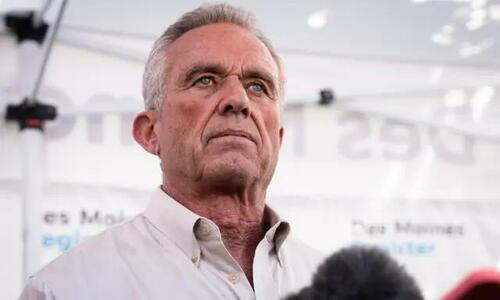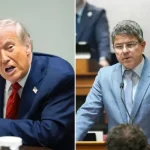
Authored by Zachary Stieber via The Epoch Times (emphasis ours),
A federal judge has rejected a request from presidential candidate Robert F. Kennedy Jr. for an order that would block Google from censoring him.

Google and its subsidiary, YouTube, have removed multiple videos of Mr. Kennedy in recent months because they allegedly contained medical misinformation.
The removals violate Mr. Kennedy's First Amendment rights because they were spurred by government policy, Mr. Kennedy's lawyers said in a motion for a temporary restraining order.
Evidence from another case has shown that government officials regularly collaborated with Big Tech companies such as Google to censor users, and YouTube's policy is that information contradicting U.S. Centers for Disease Control and Prevention (CDC) guidance will be censored.
Google "is using a policy that it developed in connection with (and in response to demands from) the incumbent government to silence one of the government’s most prominent critics," Mr. Kennedy's motion stated.
The order would have blocked Google from using its misinformation policies to remove videos of Mr. Kennedy from YouTube until a trial is held.
Google said in response that it is separate from the government and that it has been exercising its own discretion in removing videos.
"The First Amendment protects Google’s judgment that it will not help spread dangerous anti-vaxx propaganda," Google lawyers said.
U.S. District Judge Trina Thompson on Aug. 23 sided with Google.
"Plaintiff has not shown that the government so 'insinuated itself into a position of interdependence' with Google or that it 'exercised coercive power or has provided such significant encouragement' to Google that give rise to state action," Judge Thompson, an appointee of President Joe Biden, ruled.
Government Emails
Mr. Kennedy's lawyers had pointed out emails uncovered in discovery in a different case that showed that White House officials communicated with Google officials about misinformation, including one that showed a White House official saying that removing content on vaccine hesitancy from YouTube was "a concern that is shared at the highest (and I mean highest) levels of the WH." Other messages showed Google asking for officials to provide "evidence-based input" on specific claims.
Google also alerted the Department of Health and Human Services in 2021, after being pressured by Surgeon General Vivek Murthy's team to "stop the spread of health misinformation," that it adopted an updated misinformation policy that cited, among other authorities, the CDC on COVID-19 and vaccines. The new policy "prohibits content that includes harmful misinformation about the safety, efficacy, or ingredients for currently administrated vaccines," the Google official said.
While Mr. Kennedy argued that the messages show the need for a restraining order, Judge Thompson said they were "insufficient to deem YouTube's decisions to be deemed that of the state."
"There is no evidence before the court that any of the identified government officials, who are not parties to this case, demanded that Google adopt a COVID-19 medical misinformation or vaccine misinformation policy. Moreover, there is no evidence before the Court that government officials communicated with Google regarding Kennedy at all," the judge said.
"Rather, the evidence reflects that the nature of the communications between officials from the White House, Office of the Surgeon General, and Center for Disease Control and Prevent and Google is one of 'consultation and information sharing.'"
Mr. Kennedy has been able to post content on Google competitors such as X, formerly known as Twitter, undercutting claims that he was irreparably harmed, the judge said.
Even if Mr. Kennedy could establish that Google was a state actor by providing evidence its conduct was coerced by the government, First Amendment rights are "not unencumbered by any restrictions," Judge Thompson said.
"The coronavirus still poses a health risk to certain individuals, and it would not serve the public interest to let medical misinformation proliferate on YouTube," she said.
Mr. Kennedy hasn't yet responded to the ruling.
One of his lawyers told The Epoch Times after a hearing on the motion for a restraining order that the arguments centered on the differences between Google and publishers.
"Our argument is that Google is not a publisher. So it's not like The New York Times, where it can promote a certain message and it takes responsibility for that message. Google is a platform that just posts information and it takes no responsibility for what is for what is said. So that's a difference," the lawyer said.
"Their whole argument that they're going to be forced to host the speech. They already host all the speech. And our argument is that they can't then remove it after the fact by working with the government and relying on government sources."
The case will now move forward to other motions.
Mr. Kennedy has also asked for a preliminary injunction, and Google has filed a motion to dismiss.
Those motions will be the subject of the next hearing, scheduled to take place on Nov. 7.
Lear Zhou contributed to this report.
Authored by Zachary Stieber via The Epoch Times (emphasis ours),
A federal judge has rejected a request from presidential candidate Robert F. Kennedy Jr. for an order that would block Google from censoring him.

Google and its subsidiary, YouTube, have removed multiple videos of Mr. Kennedy in recent months because they allegedly contained medical misinformation.
The removals violate Mr. Kennedy’s First Amendment rights because they were spurred by government policy, Mr. Kennedy’s lawyers said in a motion for a temporary restraining order.
Evidence from another case has shown that government officials regularly collaborated with Big Tech companies such as Google to censor users, and YouTube’s policy is that information contradicting U.S. Centers for Disease Control and Prevention (CDC) guidance will be censored.
Google “is using a policy that it developed in connection with (and in response to demands from) the incumbent government to silence one of the government’s most prominent critics,” Mr. Kennedy’s motion stated.
The order would have blocked Google from using its misinformation policies to remove videos of Mr. Kennedy from YouTube until a trial is held.
Google said in response that it is separate from the government and that it has been exercising its own discretion in removing videos.
“The First Amendment protects Google’s judgment that it will not help spread dangerous anti-vaxx propaganda,” Google lawyers said.
U.S. District Judge Trina Thompson on Aug. 23 sided with Google.
“Plaintiff has not shown that the government so ‘insinuated itself into a position of interdependence’ with Google or that it ‘exercised coercive power or has provided such significant encouragement’ to Google that give rise to state action,” Judge Thompson, an appointee of President Joe Biden, ruled.
Government Emails
Mr. Kennedy’s lawyers had pointed out emails uncovered in discovery in a different case that showed that White House officials communicated with Google officials about misinformation, including one that showed a White House official saying that removing content on vaccine hesitancy from YouTube was “a concern that is shared at the highest (and I mean highest) levels of the WH.” Other messages showed Google asking for officials to provide “evidence-based input” on specific claims.
Google also alerted the Department of Health and Human Services in 2021, after being pressured by Surgeon General Vivek Murthy’s team to “stop the spread of health misinformation,” that it adopted an updated misinformation policy that cited, among other authorities, the CDC on COVID-19 and vaccines. The new policy “prohibits content that includes harmful misinformation about the safety, efficacy, or ingredients for currently administrated vaccines,” the Google official said.
While Mr. Kennedy argued that the messages show the need for a restraining order, Judge Thompson said they were “insufficient to deem YouTube’s decisions to be deemed that of the state.”
“There is no evidence before the court that any of the identified government officials, who are not parties to this case, demanded that Google adopt a COVID-19 medical misinformation or vaccine misinformation policy. Moreover, there is no evidence before the Court that government officials communicated with Google regarding Kennedy at all,” the judge said.
“Rather, the evidence reflects that the nature of the communications between officials from the White House, Office of the Surgeon General, and Center for Disease Control and Prevent and Google is one of ‘consultation and information sharing.'”
Mr. Kennedy has been able to post content on Google competitors such as X, formerly known as Twitter, undercutting claims that he was irreparably harmed, the judge said.
Even if Mr. Kennedy could establish that Google was a state actor by providing evidence its conduct was coerced by the government, First Amendment rights are “not unencumbered by any restrictions,” Judge Thompson said.
“The coronavirus still poses a health risk to certain individuals, and it would not serve the public interest to let medical misinformation proliferate on YouTube,” she said.
Mr. Kennedy hasn’t yet responded to the ruling.
One of his lawyers told The Epoch Times after a hearing on the motion for a restraining order that the arguments centered on the differences between Google and publishers.
“Our argument is that Google is not a publisher. So it’s not like The New York Times, where it can promote a certain message and it takes responsibility for that message. Google is a platform that just posts information and it takes no responsibility for what is for what is said. So that’s a difference,” the lawyer said.
“Their whole argument that they’re going to be forced to host the speech. They already host all the speech. And our argument is that they can’t then remove it after the fact by working with the government and relying on government sources.”
The case will now move forward to other motions.
Mr. Kennedy has also asked for a preliminary injunction, and Google has filed a motion to dismiss.
Those motions will be the subject of the next hearing, scheduled to take place on Nov. 7.
Lear Zhou contributed to this report.
Loading…





